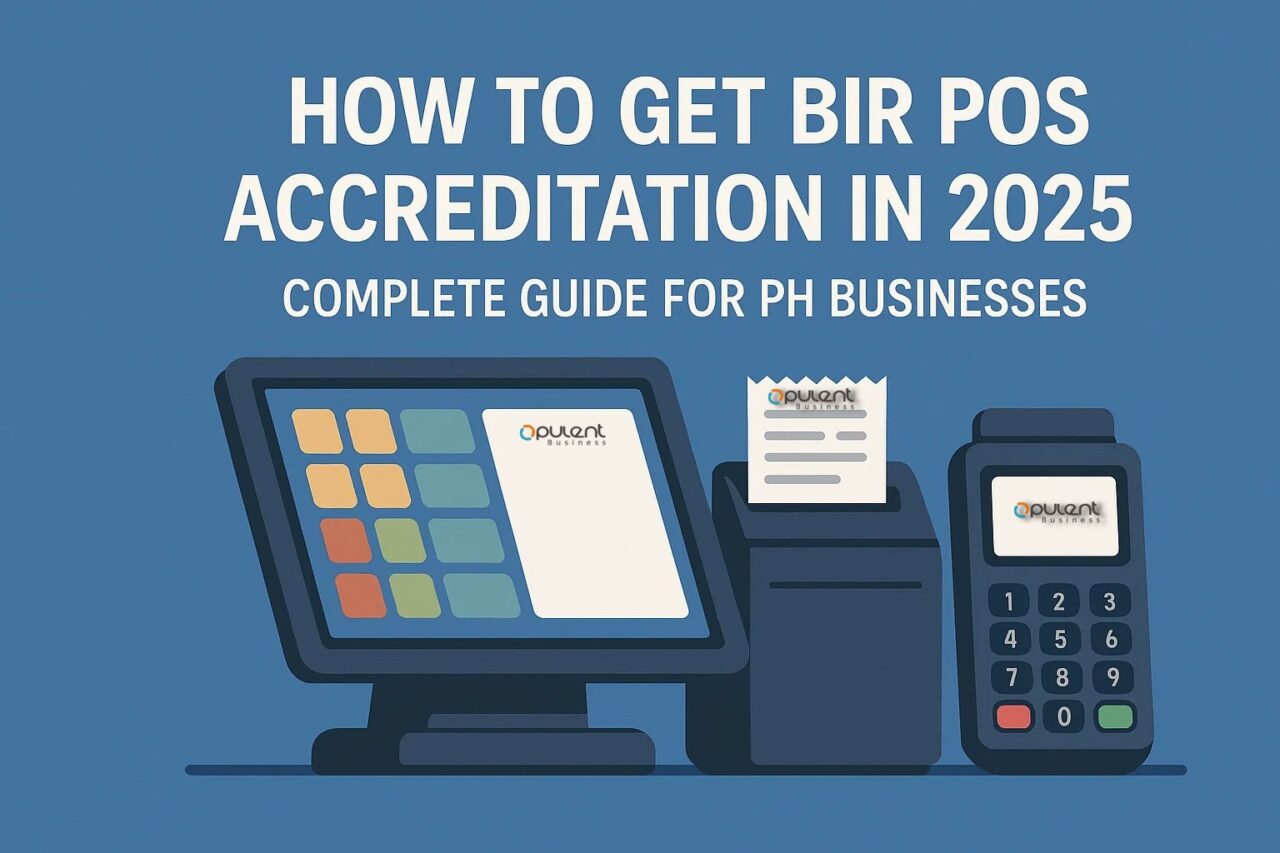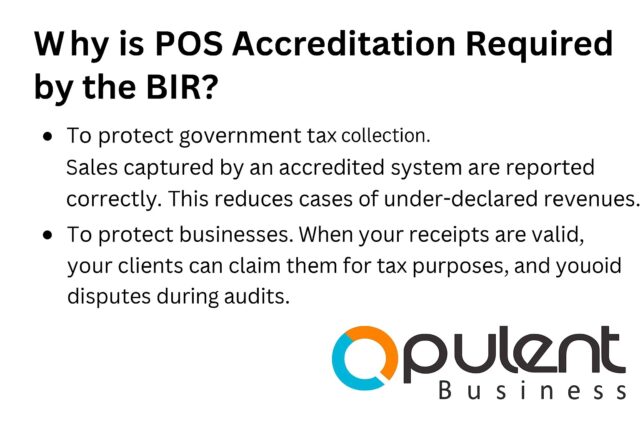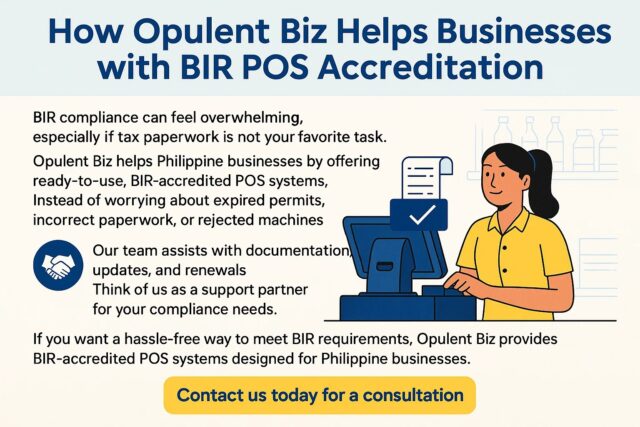One of the most important compliance requirements for retail and service businesses in the Philippines is BIR POS Accreditation. For running a business in the Philippines requires more than just great products, services, or customer-friendly staff. You also need to follow the tax rules set by the Bureau of Internal Revenue (BIR). If you are planning to open a new shop, upgrade your checkout system, or make sure your receipts are valid, this guide will help you understand everything about the process.
Here is why this matters: an accredited Point-of-Sale (POS) system makes your sales receipts legally valid for tax purposes. It protects your business from penalties and boosts your credibility with both customers and tax authorities.
Let’s break it down.
What is BIR POS Accreditation?
BIR POS Accreditation is the formal approval of a Point-of-Sale system for business use in the Philippines. This means the BIR has checked the machine or software to ensure:
- It generates valid Official Receipts or Sales Invoices
- It meets technical standards so data cannot easily be tampered with
- It complies with Philippine tax regulations under the National Internal Revenue Code
In short, your cash register or POS software should not only help you record sales but must also meet tax laws. Without BIR accreditation, the receipt you issue is not considered valid in an audit or for input VAT claims.
Why is POS Accreditation Required by the BIR?
The BIR requires accreditation for two main reasons:
- To protect government tax collection. Sales captured by an accredited system are reported correctly. This reduces cases of under-declared revenues.
- To protect businesses. When your receipts are valid, your clients can claim them for tax purposes, and you avoid disputes during audits.
Legal framework and regulations
The requirement for POS accreditation is rooted in the National Internal Revenue Code (NIRC), as amended, along with revenue regulations issued by the BIR. A few important references include:
- Revenue Regulation (RR) No. 9-2009 – Defines rules on the accreditation of Cash Register Machines (CRM) and POS machines
- Revenue Memorandum Circulars (RMCs) over the years – Provide clarifications on data recording, reporting, and procedures
- TRAIN Law (RA 10963) – Strengthens digital compliance and supports future e-invoicing requirements
(Source: Revenue Regulations 9-2009, Bureau of Internal Revenue, 2009, https://www.bir.gov.ph)
Who needs an accredited POS system?
All businesses engaged in retail, food and beverage, services, wholesale, and any enterprise that issues sales invoices to customers must use accredited machines. Small stalls, coffee shops, supermarkets, online shops with physical sales, and even service-based businesses that regularly issue receipts fall under this requirement.
There are a few exemptions such as very small enterprises allowed to issue manual receipts, but most business owners aiming for growth need an accredited POS.
Benefits of BIR-Accredited POS Systems for Businesses
Getting accredited is not just about avoiding penalties. It also brings advantages that can help your business operations.
Tax compliance and valid receipts
Using an accredited system ensures that every printed invoice is recognized by the BIR. This protects your business during audits and strengthens your standing with clients. Companies looking for suppliers often avoid vendors whose receipts are not valid for tax claims.
Business credibility and smoother audits
An accredited system gives assurance to customers that you are a legitimate business following tax rules. During audits, BIR examiners can easily verify your sales using the data from your accredited POS, which can reduce back-and-forth communication and stress for your accounting team.
Risks of Using a Non-Accredited POS
Skipping accreditation can lead to serious issues. Here are the main risks:
Penalties and fines from BIR
Under the Tax Code and its implementing regulations, businesses caught using non-accredited machines can face the following:
- Administrative fines (typically ranging from ₱10,000 upwards, depending on the violation)
- Confiscation of machines that are not accredited
- Suspension of business operations until compliant systems are in place
(Source: Revenue Regulations 9-2009, Bureau of Internal Revenue, 2009, https://www.bir.gov.ph)
Common mistakes businesses make
Many owners unknowingly commit mistakes such as:
Buying cheaper POS systems online without checking BIR approval
Continuing to use old machines that have expired accreditation
Forgetting to renew their POS permit when updating or replacing machines
These errors can trigger costly fines and disrupt business operations.
Key Requirements for POS Accreditation
Now that you understand why accreditation matters, let’s look at the actual process.
Documentation businesses need
Before visiting your Revenue District Office (RDO), prepare the following documents:
- Duly accomplished BIR Application Form (BIR Form 1906 – Authority to Print Receipts/Invoices, or related forms)
- Business registration documents , such as Certificate of Registration (BIR Form 2303)
- DTI Certificate (for sole proprietorships) or SEC Certificate (for corporations)
- Accreditation certificate and technical specifications of your POS provider
- Identification of authorized representatives
Always check with your RDO for the latest list because requirements may change.
Steps in the accreditation process
Here is the usual process followed by Philippine businesses:
- Select a BIR-accredited POS vendor. You cannot buy just any machine; it must be on the BIR’s list of accredited suppliers.
- File application with your RDO using the necessary BIR forms and supporting documents.
- System evaluation by the BIR. They check if the POS is compliant with technical standards.
- Issuance of a Permit to Use (PTU). This is the official approval that your POS can generate valid invoices.
- Regular renewal and updates. If you upgrade or replace the system, you must go through the process again.
(Source: Bureau of Internal Revenue – Accreditation Guidelines, https://www.bir.gov.ph)
Understanding the Technical Requirements
The BIR has specific technical standards that every POS system must meet. These standards ensure that sales data remains accurate and tamper-proof.
Data security features
Your POS system must have built-in security features that prevent unauthorized changes to sales records. This includes:
- Encrypted data storage
- Audit trails that track all system changes
- Password protection for administrative functions
- Automatic backup capabilities
Reporting capabilities
An accredited POS must generate reports that the BIR can easily review during inspections. These reports include:
- Daily sales summaries
- Monthly and annual sales reports
- VAT and non-VAT sales breakdowns
- Void and return transaction logs
Hardware specifications
The physical components of your POS system must meet durability and reliability standards. This covers:
- Receipt printers that produce clear, long-lasting prints
- Storage devices with sufficient capacity for transaction records
- Backup power options to prevent data loss during outages
The Application Process in Detail
Let’s walk through each step of getting your POS accredited.
Step 1: Choose the right POS provider
Start by researching POS providers with current BIR accreditation. Ask potential suppliers for:
- Their BIR accreditation certificate
- List of features that comply with BIR requirements
- Support services for maintaining compliance
- Track record with other Philippine businesses
Step 2: Prepare your business documents
Gather all required paperwork before heading to your RDO. Missing documents will delay your application. Create a checklist and verify each document is complete and up-to-date.
Step 3: Submit your application
Visit your RDO with all documents. The staff will review your submission and may ask questions about your business operations. Be prepared to explain:
- Your average daily transactions
- Types of products or services you sell
- Number of branches or outlets
- Current receipt-issuing practices
Step 4: Wait for BIR evaluation
The BIR will inspect your POS system to verify it meets all technical requirements. This evaluation typically takes 15 to 30 working days, depending on your RDO’s workload.
Step 5: Receive your Permit to Use
Once approved, you’ll receive your PTU. This document authorizes you to use the POS system for issuing official receipts. Keep the original in a safe place and post a copy near your POS terminal.
Maintaining Your POS Accreditation
Getting accredited is just the beginning. You need to maintain compliance throughout your permit’s validity period.
Regular system updates
Keep your POS software updated with the latest versions approved by the BIR. Updates often include:
- Bug fixes that affect receipt printing
- New features required by updated regulations
- Security patches to protect transaction data
Annual compliance checks
Review your POS compliance annually. Check if:
- Your PTU is still valid
- Your business information matches BIR records
- Your POS provider maintains their accreditation
- New regulations affect your system requirements
Record keeping requirements
Maintain proper records of all POS-related documents:
- Original PTU and renewal documents
- POS purchase receipts and contracts
- Maintenance and repair records
- System update logs
Common Challenges and Solutions
Many businesses face similar challenges when dealing with POS accreditation. Here are practical solutions:
Challenge: Long processing times at RDO
Solution: Submit applications during off-peak months (avoid January and April). Prepare duplicate copies of all documents. Follow up weekly to track your application status.
Challenge: High cost of accredited systems
Solution: Compare prices from multiple accredited vendors. Consider leasing options instead of outright purchase. Factor the cost into your business plan as a necessary compliance expense.
Challenge: Technical issues with POS systems
Solution: Choose providers with reliable local support. Train multiple staff members on basic troubleshooting. Keep manual receipt books as backup during system downtime.
Challenge: Keeping up with regulation changes
Solution: Subscribe to BIR updates through their official website. Join business associations that share compliance information. Maintain regular communication with your POS provider about new requirements.
Special Considerations for Different Business Types
Different businesses have unique POS requirements based on their operations.
Restaurants and food service
Food businesses need POS systems that can:
- Handle multiple order types (dine-in, takeout, delivery)
- Split bills for group dining
- Track perishable inventory
- Generate kitchen order tickets
Retail stores
Retail businesses require features like:
- Barcode scanning capabilities
- Inventory management integration
- Multiple payment method support
- Customer loyalty program tracking
Service businesses
Service providers need systems that can:
- Track time-based billing
- Manage appointment schedules
- Generate service agreements
- Handle partial payments and deposits
E-commerce with physical presence
Businesses selling both online and offline must ensure their POS can:
- Sync inventory across channels
- Distinguish between online and walk-in sales
- Generate proper documentation for both sale types
- Track delivery and pickup orders
Future of POS Systems in the Philippines
The BIR continues to modernize tax collection methods. Understanding future trends helps you prepare your business.
E-invoicing initiatives
The government plans to implement electronic invoicing systems. This will:
- Reduce paper receipt usage
- Speed up VAT refund processing
- Simplify audit procedures
- Enable real-time sales monitoring
Cloud-based POS adoption
More businesses are shifting to cloud-based systems that offer:
- Remote access to sales data
- Automatic software updates
- Lower upfront costs
- Better disaster recovery options
Integration with government systems
Future POS systems may directly connect to BIR databases for:
- Automatic tax filing
- Real-time compliance monitoring
- Faster permit renewals
- Reduced manual reporting
Making the Right Choice for Your Business
Selecting an accredited POS involves more than checking the BIR list. Consider these factors:
Business size and growth plans
Choose a system that can grow with your business. Starting with a basic accredited system is fine, but ensure it can handle increased transaction volumes and additional features as you expand.
Budget considerations
Calculate the total cost of ownership including:
- Initial purchase or lease price
- Installation and training fees
- Monthly service charges
- Annual renewal costs
- Potential upgrade expenses
Technical support availability
Verify that your chosen provider offers:
- Local technical support teams
- Response time guarantees
- Training for your staff
- Regular maintenance services
- Clear escalation procedures
User-friendliness
Your staff will use the POS daily. Pick a system with:
- Intuitive interface design
- Clear transaction workflows
- Easy report generation
- Minimal training requirements
- Multi-language support if needed
FAQs on BIR POS Accreditation
- What is BIR POS Accreditation?
It is official approval by the Bureau of Internal Revenue for businesses to use a specific POS system in recording sales and issuing valid receipts.
- Who is required to use BIR-accredited POS?
Most retail and service businesses, including restaurants, supermarkets, and shops. Only very small businesses allowed to issue manual receipts may be exempt.
- How long does POS accreditation last?
The Permit to Use is typically valid for five years, but always confirm specific rules with your RDO.
- What are the penalties for non-accredited POS systems?
Fines, suspension of operations, and confiscation of illegal machines.
- Can online or e-commerce businesses use accredited POS systems?
Yes, businesses that sell online but issue invoices to Philippine customers are still required to comply. The BIR has been tightening rules on e-commerce taxation.
- How much does an accredited POS system cost?
Prices vary widely from ₱15,000 for basic systems to ₱100,000+ for advanced setups. Consider your business needs and budget carefully.
- Can I transfer my POS accreditation to a new location?
You must notify your RDO about any business location changes. The process depends on whether you’re moving within the same RDO jurisdiction or to a different one.
- What happens if my POS provider loses accreditation?
You’ll need to switch to another accredited provider. The BIR typically provides a grace period for businesses to comply.
Next Steps
Getting your POS system accredited doesn’t have to be stressful. Start by assessing your current setup and identifying what you need to change. Create a timeline for compliance that fits your business schedule.
Remember that accreditation is an investment in your business’s future. It builds trust with customers, simplifies tax compliance, and positions you for growth in the Philippine market.
How Opulent Biz Helps Businesses with BIR POS Accreditation?
BIR compliance can feel overwhelming, especially if tax paperwork is not your favorite task. Opulent Biz helps Philippine businesses by offering ready-to-use, BIR-accredited POS systems. Instead of worrying about expired permits, incorrect paperwork, or rejected machines, you can focus on running your shop while we ensure the POS meets all requirements.
Our team assists with documentation, updates, and renewals. Think of us as a support partner for your compliance needs.
If you want a hassle-free way to meet BIR requirements, Opulent Business provides BIR-accredited POS systems designed for Philippine businesses. Contact us today for a consultation.




